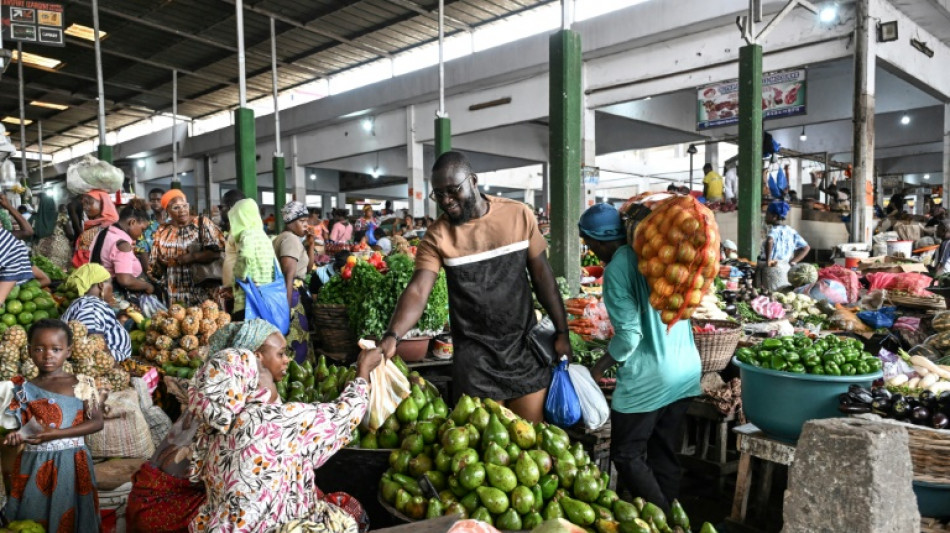

Ivory Coast chefs cook up new twist on African food
In the kitchen of his Abidjan restaurant, Ivory Coast chef Charlie Koffi prepares his country's staggering tropical bounty with the techniques of fine French cuisine. And he's far from alone.
A growing number of his fellow chefs in the West African nation are retouching local specialities with cooking skills picked up elsewhere.
One of Koffi's signature dishes is an adaptation of gouagouassou sauce, a local specialty.
In his version, a rabbit is stewed with African eggplants, spicy oil, powdered akpi seeds and local fefe pepper.
"It is one of the dishes I really loved as a child," Koffi told AFP. "As a chef, it was almost an obligation to come back to it."
Koffi was trained in France before opening his Abidjan restaurant, Villa Alfira, in 2017 to showcase his country's cuisine.
In the well-lit main dining room overlooking a pond where fish on the menu swim, Eric Guei tucked into a gouagouassou casserole.
"I find taste and audacity in this dish," the happy customer said. "It mixes Western know-how with local flavours."
Guei enjoyed the copious but beautifully presented meal with his friend Yasmine Doumbia. "Gouagouassou is a very traditional Ivory Coast dish, and to see it in a restaurant like this is a real pleasure," she said.
Villa Alfira is a change from the "maquis", typical animated local eateries where braised chickens and fish are eaten by hand, along with traditional sauces, manioc polenta, and fried plantains.
- Grilled okra and cassava chips -
A few kilometres away, a chef at the upscale restaurant La Maison Palmier is working on her new creation: a taster dish inspired by placali, a typical Ivorian dish made with sticky gumbo sauce, bits of meat and dried fish, accompanied by fermented manioc paste.
Hermence Kadio, who trained locally, has her own much lighter take on the classic. She grilled the gumbo (okra), while the cassava is puffed up and turned into chips.
Every week the restaurant's French head chef Matthieu Gasnier offers amuse-bouche -- small bite-sized appetisers -- like these to "re-awaken the memories of people who grew up with these dishes".
About half his clientele is Ivorian, he said.
"Even if our restaurant's cuisine is intended to be international since we are in a five-star hotel, I think it would be wrong not to take advantage of all these beautiful products that surround us," he said.
Grains such as fonio and sorghum grow in the Ivory Coast's hot dry northern savannas, said Koffi, while the forested south produces local varieties of spinach and typical tropical products such as bananas and yams.
- Healthier and tastier -
N'Cho Yapi, who founded the group Chefs: Creators of Emotions, said Ivorian cooks began going back to their culinary roots just after the turn of the century.
Before that, chefs at fancy restaurants "had the habit of offering Western dishes with imported products," he said. "But the cost of living kept going up," so they turned to less-expensive products "they had just under their noses".
And local specialties are appearing more and more on the menus of the luxury restaurants that have mushroomed across Abidjan in recent years, Yapi added.
Valerie Rollainth, an Ivorian chef trained in France at the famous Institut Paul Bocuse, insisted that typically hearty Ivorian cuisine is no longer suited to the capital's increasingly sedentary lifestyle.
"There are too few vegetables, a shocking quantity of oil, and the dishes are cooked too long" and lose their nutrients, she said.
At the nutritional workshops she organises she urges people to eat local products in new ways, such as raw okra, which "is very good against diabetes".
"Some diseases are linked to eating habits," she said. "In the Ivory Coast, not everyone has access to health care, but everyone has access to healthy food."
S.Cisneros--LGdM




